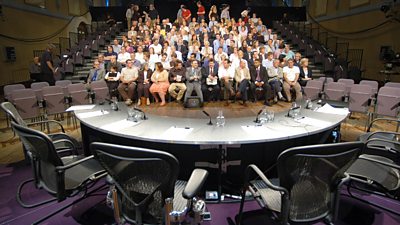Image: A panelists view of the audience, from the set of Question Time.
Beginnings
“What do we think? What do we value? What are the choices to be made? The hour to question the ideas and decisions of today. Robin Day takes the chair on stage at the Greenwood Theatre, South London, as public personalities face questions and reactions from the general public."
This was the original Radio Times billing for the first ever Question Time, broadcast on Tuesday, 25 September, 1979.
The programme was something of an experiment at the beginning, and certainly didn’t get a peak time slot. Broadcast on ����ý One at 22.50, schedulers were unsure how a simple question and answer debate might go down with an audience on a working night.
There had been a few experiments in debate type programmes before Robin Day hosted the official first edition of Question Time. Back in 1964, in a short series also called Question Time, politicians were quizzed across three debate programmes during the final days of the 1964 .
However, ordinary members of the public were kept well away, and the responsibility of taking decision makers to task was left to journalists, and to well-known establishment figures at that – William Hardcastle and Cliff Michelmore heading the line-up.
Not a single was selected to put questions to the panel.
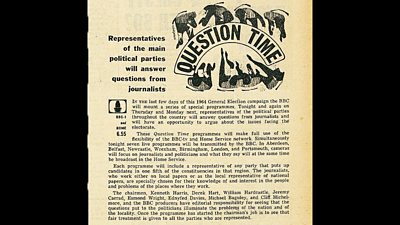
This programme was quite an innovation however, being broadcast simultaneously on ����ý One television and the main national speech radio network of the time, ����ý Home Service.
The 1960s was a time in which the ����ý was only just waking up from a climate of deference toward politicians and there was still little appetite to allow the person on the street an opportunity to debate with the political class face to face.
But, the old order could not last. The student protests of the late 1960s, the oil crisis of 1973 and growing industrial unrest, shook established political norms.
Public attitudes toward those in power were about to change forever.
The changing political landscape
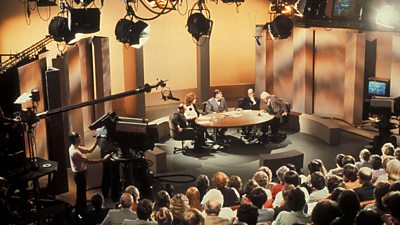
By the late 1970s, the UK was politically divided and the post-war consensus, all but over. People were losing trust in politicians and there was an appetite for direct debate with the decision makers.
Right on cue came the Question Time we know today. Despite the hesitant initial scheduling, it was to become one of the most watched political programmes on TV.
Love it or loathe it, there is something in the Punch-and-Judy style of UK politics that makes for good television. Maybe it was this that Question Time’s first producer Barbara Maxwell identified early on and exploited.
Or, was its quick success down to the behind it?
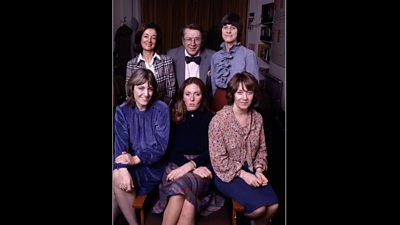
Controversy
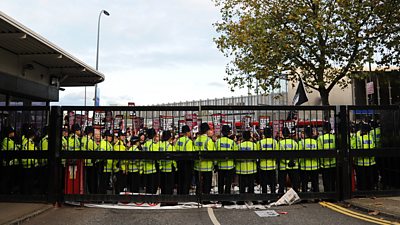
Question Time itself has made headlines. In 1981 David Steel announced on the programme that in principle he would support ‘a marriage’ between the Liberals and any party formed by the ‘Gang of Four’.
In 2001 the programme was used as a testbed for the now familiar leadership debates, when contenders for the Conservative Party leadership lined up to take questions.
Then in October 2009, Nick Griffin leader of the British National Party appeared on the programme, sparking protests outside ����ý Television Centre. An appeal to the ����ý not to broadcast the programme was made, but it still went ahead.
Question Time hit the headlines again when David Dimbleby, its chairman for 25 years gave up the post, saying he wanted to return to his first love, reporting.
Dimbleby's final appearance on Question Time was on 13 December 2018, with Fiona Bruce taking over the hot seat in January 2019.
Fiona Bruce
David Dimbleby, the television legend who left the programme at the age of 80, was always going to be a hard act to follow. It was something Fiona Bruce was only too well aware of.
She told the ����ý that the prospect of the new role was something of a worry:
"For many years Question Time has been presented by one of my television heroes, so I am thrilled and not a little daunted to be stepping into his shoes. But it is a programme I have watched for as long as I can remember and have long wanted to be part of. I can’t wait to get started."
Bruce got off to a flying start and five years in chairs the debate at a time of change in British history. Although the political shifts are different 45 years on, Question Time crucially continues to bring together leaders and thinkers from across the political spectrum in front of their harshest critics - the viewing public.
Happy Birthday Question Time!
Links
-
Join the Question Time audience How to become an audience member and ask a question on the programme
-
Join the Question Time team on Facebook
-
Any Questions? and Any Answers? Contact Any Questions? (Twitter) #bbcaq @tweeter_anita (Call) 0370 010 0444 (Email) any.answers@bbc.co.uk
